Related Research Articles
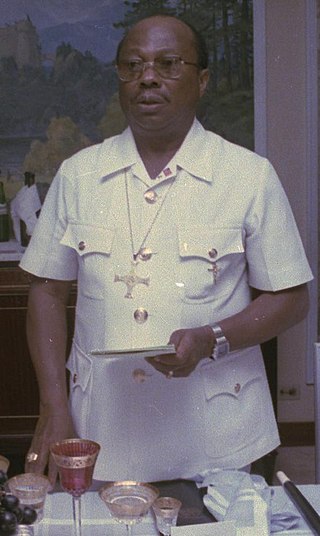
William Richard Tolbert Jr. was a Liberian politician who served as the 20th president of Liberia from 1971 until his assassination in 1980.
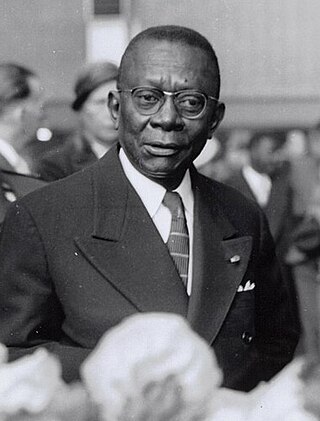
William Vacanarat Shadrach Tubman was a Liberian politician. He was the 19th president of Liberia and the longest-serving president in the country's history, serving from his election in 1944 until his death in 1971.

General elections were held in Liberia on 11 October 2005, with a runoff election for the presidency held on 8 November. The presidency and all seats in the House of Representatives and Senate were up for election. The elections were the first held since 1997 and marked the end of the political transition following the second civil war, having been stipulated in the Accra Comprehensive Peace Agreement of 2004. Ellen Johnson Sirleaf, former World Bank employee and Liberian finance minister, won the presidential contest and became the first democratically elected female African head of state in January 2006.
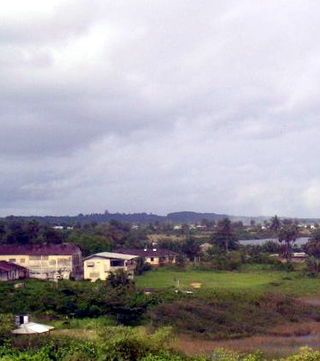
Harper, situated on Cape Palmas, is the capital of Maryland County in Liberia. It is a coastal town situated between the Atlantic Ocean and the Hoffman River. Harper is Liberia's 11th largest town, with a population of 17,837.
Winston A. Tubman is a Liberian diplomat and politician of Americo-Liberian descent. He is a former justice minister and diplomat for the nation, as well as having been the standard bearer of the Congress for Democratic Change (CDC).
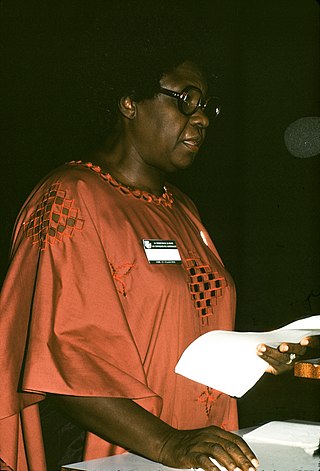
Angie Elizabeth Brooks was a Liberian diplomat and jurist. She was the only African female President of the United Nations General Assembly. She was also the second woman from any nation to head the U.N. body.

Clarence Lorenzo Simpson Sr. (1896–1969) was a Liberian politician who served as the 22nd vice president and the speaker of the House of Representatives. He served also as Secretary of State during much of World War II (1934–1943) under President Edwin Barclay, and later as Liberia's ambassador to the United States.
The Antoinette Tubman Stadium is a multi-purpose stadium located in Monrovia, Liberia. It is used mostly for football matches although it has also been used for music concerts, major church events, political rallies and Ebola treatment. It has a capacity of 10,000 spectators and is the oldest stadium in Liberia.

William V. S. Tubman University, commonly known as Tubman University, is a public university located in Harper, Maryland County, Liberia. The university is named after William Tubman, the 19th President of Liberia.

General elections were held in Liberia on 1 May 1951, the first to be held under universal suffrage; previously only male descendants of Americo-Liberians had been allowed to vote. This was the first elections in Liberia where women and the local Liberians owning property were allowed to vote based on a Constitutional Referendum in 1945–46. In the presidential election, William Tubman of the True Whig Party was the only candidate, and was re-elected unopposed.

Antoinette Louise Padmore Tubman was the wife of the Liberian politician William S. Tubman and the First Lady of Liberia from 1948 to 1971.
A. Doris Banks Henries was an American educator and writer in Liberia, and Assistant Minister of Education during the Tolbert administration.

Fatima Massaquoi-Fahnbulleh was a Liberian writer and academic. After completing her education in the United States, she returned to Liberia in 1946, making significant contributions to the cultural and social life of the country.
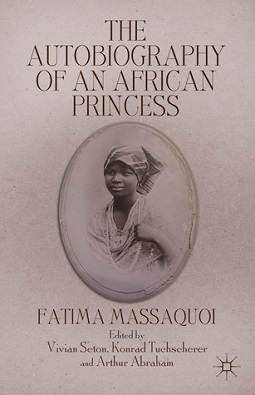
The Autobiography of an African Princess, published in 2013, is an account of the early years (1912–1946) in the life of Fatima Massaquoi, a descendant of the royal families of the Gallinas from Sierra Leone and Liberia. It describes her early childhood in Africa, her schooling in Germany and Switzerland and her university studies in the United States.
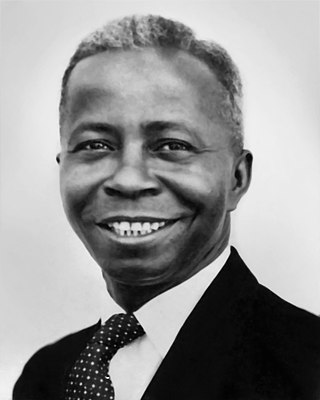
Edison Reginald Townsend was a Liberian journalist and statesman known for the establishment of Liberia's Information Services. He served as Secretary of Information and Cultural Affairs under President William Tubman, and as Minister of State for Presidential Affairs under President William Tolbert. In 1979 he was elected National Chairman of the True Whig Party. Following the 1980 Liberian coup d'état of President Tolbert on April 12, 1980, he and several other members of the Tolbert administration were put on trial and without due process executed by firing squad on April 22, 1980.

Americo-Liberian people, are a Liberian ethnic group of African American, Afro-Caribbean, and liberated African descent. The sister ethnic group of Americo-Liberians are the Sierra Leone Creole people, who share similar ancestry and related culture. Americo-Liberians trace their ancestry to free-born and formerly enslaved African Americans who emigrated in the 19th century to become the founders of the state of Liberia. They identified there as Americo-Liberians. Some African Americans following resettlement in Canada also participated as founding settlers in Sierra Leone and other Recaptive repatriates settled in present-day Côte d'Ivoire.

The Center for National Documents and Records serves as the national archives of Liberia. It was headquartered on Tubman Boulevard in the Sinkor section of the city of Monrovia until 1992, when it moved to Ashmun Street. Directors have included Philomena Bloh Sayeh.

Liberia–Soviet relations were the bilateral relations between Liberia and Soviet Union. Contacts between the two countries were sporadic during the 1950s and 1960s, improved during the 1970s but became frosty in the 1980s.
Emily Harvie Thomas Tubman was an American philanthropist. Born in Virginia, she became a prominent socialite and businesswoman in Augusta, Georgia, and was an early supporter of the Christian Church.
The Liberian Women's Social and Political Movement was a Liberian women's organization founded by Sarah Simpson-George in 1946.
References
- ↑ Florence Mugambi, Blazing a trail: Women Africanist PhDs, Northwestern Program of African Studies News and Events, Vol. 30, No. 3 (Spring 2020).